By Kenton X. Chance
ST. GEORGE’S, Grenada (CMC) — The Eastern Caribbean Telecommunications Authority (ECTEL) says it is aware of allegations in the media that telecommunication provider Digicel is blocking on its network calls made using voice over Internet protocols (VOIPs) such as WhatsApp.
“We have written to the National Telecommunications Regulatory Commissions (NTRCs) asking them to provide reports. We have not received any formal reports,” Embert Charles, managing director of ECTEL told the Caribbean Media Corporation (CMC) on Wednesday.
Charles, however, said that ECTEL — the regulatory body for telecommunications in Dominica, Grenada, St. Kitts and Nevis, St. Lucia, and St. Vincent and the Grenadines — has received copies of letters circulated in the media in St. Lucia.
“We are examining the veracity of that as evidence to go further,” he told CMC.
In St. Lucia, Jadia Jn Pierre-Emmanuel, the press secretary to Prime Minister Dr. Kenny Anthony, brought the issue to the fore after an attempted WhatsApp call to a relative was reportedly blocked by Digicel on the weekend.
Jn Pierre-Emmanuel received a message from Digicel saying that the company “Couldn’t place call because your phone’s cellular network prevents WhatsApp calls. Try connecting to Wi-Fi and call again,” St. Lucia Voice newspaper has reported.
The communications specialist noted that she has an EC$500 (one EC dollar =US$0.37 cents) monthly plan with Digicel and is making the case that the company should allow her to use her data as she sees fit.
Some telecommunications providers in the region have argued that VOIPS such as WhatsApp, which they describe as over the top (OTT) service providers, use data without paying.
Charles told CMC that ECTEL wrote to Digicel about the situation a year ago, telling the company that based on ECTEL’s policy of net neutrality, “it is improper to block these services where people use data for innovative purposes”.
Net neutrality refers to the principle that Internet service providers should enable access to all content and applications regardless of the source, and without favouring or blocking particular products or websites.
Asked if it illegal for telecommunications providers within ECTEl to block VOIPs, Charles told CMC, “It is legal for any provider to safeguard their networks. If, in their view, the contract they have with the subscribers is being breached — and consumers should be aware of their contracts — then they have that right.
“But, if you are providing a data service, then in this day and age of convergence, there is no reason why a service that is using data should be blocked.”
He, however, said that it is not a generic situation and there are cases where OTT services consumer more of a network’s recourses than others, hence the reason why Digicel has been “in that kind of situation”.
The situation persists even as telecommunications ministers from across the region said at the annual meeting of regional telecommunication association, CANTO, in 2014 and 2015 that they believe subscribers across the Caribbean should be allowed to use data as they wish.
Charles said this is still the position of telecommunication minsters within ECTEL.
“This was reiterated at the CANTO meeting in Miami this year, and the ministers were very adamant that the providers should not block over the top services.
“In fact, they were very specific this year and they have asked the providers, through CANTO, to come up with a plan to resolve the situation very soon, and certainly before the next CANTO meeting comes up,” Charles said.
“In fact, some of them have indicated that that might determine their continued participation in CANTO. They feel very, very strong about this matter,” he told CMC.
Charles outlined the steps consumers can take to lodge a complaint if they feel their service providers are blocking VOIP calls.
“Unlike what has been happening, your first step is to engage your provider and indicate that the service is being blocked. If the provider indicates to you that it is not, then you have to prove that it is not being blocked. You continue to document these cases.
“Your next stage, and even simultaneously, you can go to your local NTRCs, in the case of ECTEL, and once we have that evidence, we can call in the provider to ask them to explain,” he told CMC.
Charles said that ECTEL has met with Digicel and their regulatory officials, who have said that the company is not blocking OTTs.
“Officially, they have said that to ECTEL.”
Regarding the advocacy in St. Lucia, Charles reiterated that there are particular steps to lodging complaints about a telecommunications service provider.
“Whatever groundswell you have, you should confront the service provider in a very organized way. If that fails, you consult the NTRC in an organised way, NTRC will bring ECTEL into the play, and I think we have a better case going forward, in terms of dealing with the situation,” he told CMC.
He said ECTEL has to look at the legal parameters of the situation.
“We are guided by law. We look and see what laws give us certain powers to intervene,” Charles said.






